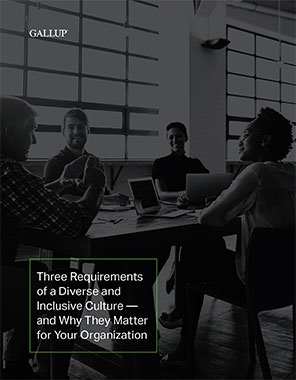Story Highlights
- Workplace discrimination causes disengagement and undermines wellbeing
- Discrimination has a more pervasive effect on Black and Hispanic workers
- Greater inclusivity starts with an awareness of these effects
A recent Gallup survey of U.S. workers finds that workplace discrimination can affect employees' perceptions of an organization's culture, their opportunities, and their coworkers' intentions. Workplace discrimination can also affect their feelings of psychological safety and belonging and their ability to do their best work.
But workplace discrimination doesn't affect everyone equally. Twenty-four percent of Black and Hispanic employees reported experiencing discrimination at work in the past 12 months, as did 15% of White employees and 16% of Asian employees. But 75% of Black employees say that discrimination was related to their race or ethnicity, compared with 61% of Hispanic and 42% of White workers. And the Gallup study finds that discrimination undermines employee wellbeing, more so for Black and Hispanic workers than White ones.
| White | Black | Hispanic | |||||||||||||||||||||||||||||||||||||||||||||||||||||||||||||||||||||||||||||||||||||||||||||||||
|---|---|---|---|---|---|---|---|---|---|---|---|---|---|---|---|---|---|---|---|---|---|---|---|---|---|---|---|---|---|---|---|---|---|---|---|---|---|---|---|---|---|---|---|---|---|---|---|---|---|---|---|---|---|---|---|---|---|---|---|---|---|---|---|---|---|---|---|---|---|---|---|---|---|---|---|---|---|---|---|---|---|---|---|---|---|---|---|---|---|---|---|---|---|---|---|---|---|---|---|
| No | Yes | No | Yes | No | Yes | ||||||||||||||||||||||||||||||||||||||||||||||||||||||||||||||||||||||||||||||||||||||||||||||
| % | % | % | % | % | % | ||||||||||||||||||||||||||||||||||||||||||||||||||||||||||||||||||||||||||||||||||||||||||||||
| Thriving | 56 | 54 | 51 | 37 | 53 | 38 | |||||||||||||||||||||||||||||||||||||||||||||||||||||||||||||||||||||||||||||||||||||||||||||
| Gallup Panel, Nov. 6-Dec. 1, 2020 | |||||||||||||||||||||||||||||||||||||||||||||||||||||||||||||||||||||||||||||||||||||||||||||||||||
Though the experience of discrimination is unique to the individual, the survey shows that the perception of discrimination has a more profound and pervasive effect on Black and Hispanic employees than on White ones. That disparity holds important implications for organizational cultures, workplace outcomes and wellbeing. To understand those implications -- and engineer greater inclusivity -- it's important for leaders to first understand the impact of the experience of discrimination on employees and employers.
Engagement and Satisfaction
Discrimination, understandably, drains employees' motivation, commitment to their jobs and their engagement. For example, those who report discrimination in their workplace are less likely to strongly agree that they have the opportunity to do what they do best, that their opinions count, or that someone at work cares about them as a person. And those who endure discrimination are much more likely to be attrition risks -- whether actively looking for another job or watching for opportunities -- than employees who don't feel discriminated against.
Indeed, Black and Hispanic employees who experience discrimination are substantially less likely to report being satisfied with their place of employment as a place to work, even less satisfied than White employees who feel discriminated against. Strikingly, there is less than a 1 percentage point difference in overall satisfaction for White workers who experience discrimination versus those who don't, but overall satisfaction is 9 points lower for Hispanic employees and 13 points lower for Black employees who report discrimination compared with those who don't.
Black employees who experience discrimination are also 6x less likely than White and 4x less likely than Hispanic employees to say they would recommend their organization as a great place to work. Considering that approximately one in four Black workers say they've faced discrimination, the experience of discrimination makes it improbable that organizational alumni will become brand ambassadors. And Gallup finds that, as it is, only 10% of Americans strongly agree they'd recommend their former employer as a place to work.
| White | Black | Hispanic | |||||||||||||||||||||||||||||||||||||||||||||||||||||||||||||||||||||||||||||||||||||||||||||||||
|---|---|---|---|---|---|---|---|---|---|---|---|---|---|---|---|---|---|---|---|---|---|---|---|---|---|---|---|---|---|---|---|---|---|---|---|---|---|---|---|---|---|---|---|---|---|---|---|---|---|---|---|---|---|---|---|---|---|---|---|---|---|---|---|---|---|---|---|---|---|---|---|---|---|---|---|---|---|---|---|---|---|---|---|---|---|---|---|---|---|---|---|---|---|---|---|---|---|---|---|
| No | Yes | No | Yes | No | Yes | ||||||||||||||||||||||||||||||||||||||||||||||||||||||||||||||||||||||||||||||||||||||||||||||
| % | % | % | % | % | % | ||||||||||||||||||||||||||||||||||||||||||||||||||||||||||||||||||||||||||||||||||||||||||||||
| Engaged | 41 | 36 | 37 | 23 | 36 | 21 | |||||||||||||||||||||||||||||||||||||||||||||||||||||||||||||||||||||||||||||||||||||||||||||
| Extremely satisfied with your place of employment as a place to work | 35 | 35 | 30 | 17 | 31 | 22 | |||||||||||||||||||||||||||||||||||||||||||||||||||||||||||||||||||||||||||||||||||||||||||||
| Actively looking for another job/Watching for job opportunities | 37 | 74 | 52 | 70 | 48 | 74 | |||||||||||||||||||||||||||||||||||||||||||||||||||||||||||||||||||||||||||||||||||||||||||||
| Extremely likely to recommend this organization as a great place to work | 34 | 32 | 32 | 20 | 28 | 25 | |||||||||||||||||||||||||||||||||||||||||||||||||||||||||||||||||||||||||||||||||||||||||||||
| Gallup Panel, Nov. 6-Dec. 1, 2020 | |||||||||||||||||||||||||||||||||||||||||||||||||||||||||||||||||||||||||||||||||||||||||||||||||||
Inclusion
Gallup's definition of inclusion is "an environment that makes people feel welcome, respected and valued." It's to be expected, then, that employees who report experiencing discrimination at work in the past 12 months are far less likely to strongly agree that they are treated with respect, feel like valued members of their team, or are comfortable being themselves at work. Those effects are felt with greater magnitude among Black employees than other ethnic groups, and it appears to significantly affect Black employees' sense of autonomy -- about half as many Black workers as Hispanic or White employees can strongly agree that they have the freedom to make the decisions they need to do their jobs well -- 17% among Black workers who report having an experience with discrimination compared to 27% of White workers and 28% of Hispanic workers who report having an experience with discrimination.
The perception of discrimination has a more profound and pervasive effect on Black and Hispanic employees than on White ones.
A feeling of exclusion can prompt employees to develop a persona -- or "code switch" -- to enable their inclusion. That behavior saps employees' energy and cloaks their full value. In fact, among those who say they've been discriminated against, the percentage of Black and Hispanic employees who say their unique strengths are being developed is far lower than the percentage of White employees who say their employers build on their strengths.
| White | Black | Hispanic | |||||||||||||||||||||||||||||||||||||||||||||||||||||||||||||||||||||||||||||||||||||||||||||||||
|---|---|---|---|---|---|---|---|---|---|---|---|---|---|---|---|---|---|---|---|---|---|---|---|---|---|---|---|---|---|---|---|---|---|---|---|---|---|---|---|---|---|---|---|---|---|---|---|---|---|---|---|---|---|---|---|---|---|---|---|---|---|---|---|---|---|---|---|---|---|---|---|---|---|---|---|---|---|---|---|---|---|---|---|---|---|---|---|---|---|---|---|---|---|---|---|---|---|---|---|
| No | Yes | No | Yes | No | Yes | ||||||||||||||||||||||||||||||||||||||||||||||||||||||||||||||||||||||||||||||||||||||||||||||
| % | % | % | % | % | % | ||||||||||||||||||||||||||||||||||||||||||||||||||||||||||||||||||||||||||||||||||||||||||||||
| At work, I feel comfortable being myself. | 43 | 29 | 45 | 26 | 44 | 30 | |||||||||||||||||||||||||||||||||||||||||||||||||||||||||||||||||||||||||||||||||||||||||||||
| I feel like a valued member of my team. | 42 | 29 | 38 | 20 | 38 | 27 | |||||||||||||||||||||||||||||||||||||||||||||||||||||||||||||||||||||||||||||||||||||||||||||
| My current employer is committed to building the strengths of each employee. | 28 | 27 | 27 | 16 | 28 | 20 | |||||||||||||||||||||||||||||||||||||||||||||||||||||||||||||||||||||||||||||||||||||||||||||
| My supervisor creates an environment that is trusting and open. | 37 | 28 | 33 | 20 | 35 | 22 | |||||||||||||||||||||||||||||||||||||||||||||||||||||||||||||||||||||||||||||||||||||||||||||
| Gallup Panel, Nov. 6-Dec. 1, 2020 | |||||||||||||||||||||||||||||||||||||||||||||||||||||||||||||||||||||||||||||||||||||||||||||||||||
Fairness and Equity
The study found that those who feel they've been discriminated against tend to have a negative view of fairness and equity in their companies. Though that perception was found among all ethnic groups, it's more pervasive among Black and Hispanic workers -- some of whom feel discrimination isn't just personal, it's systemic -- and it can breed skepticism that the company can be trusted to do the right thing in matters of compliance, ethics, integrity and advancement.
In fact, Black workers who report experiencing discrimination in the workplace are less likely to say their workplace supports their development, goals and hopes of advancement.
That's why leaders should understand that workers can perceive discrimination as both personal and institutional. Considering that most Black and Hispanic workers attribute their discrimination to racism, and they're more dubious about their organization's commitment to racial justice or equality, a lived experience of discrimination at work will constantly undermine leaders' diversity-positive rhetoric and initiatives -- and may deplete the employee's will to engage in the work.
| White | Black | Hispanic | |||||||||||||||||||||||||||||||||||||||||||||||||||||||||||||||||||||||||||||||||||||||||||||||||
|---|---|---|---|---|---|---|---|---|---|---|---|---|---|---|---|---|---|---|---|---|---|---|---|---|---|---|---|---|---|---|---|---|---|---|---|---|---|---|---|---|---|---|---|---|---|---|---|---|---|---|---|---|---|---|---|---|---|---|---|---|---|---|---|---|---|---|---|---|---|---|---|---|---|---|---|---|---|---|---|---|---|---|---|---|---|---|---|---|---|---|---|---|---|---|---|---|---|---|---|
| No | Yes | No | Yes | No | Yes | ||||||||||||||||||||||||||||||||||||||||||||||||||||||||||||||||||||||||||||||||||||||||||||||
| % | % | % | % | % | % | ||||||||||||||||||||||||||||||||||||||||||||||||||||||||||||||||||||||||||||||||||||||||||||||
| My organization is fair to everyone. | 30 | 27 | 28 | 12 | 31 | 18 | |||||||||||||||||||||||||||||||||||||||||||||||||||||||||||||||||||||||||||||||||||||||||||||
| If I raised a concern about how I am treated, I am confident my employer would do what is right. | 35 | 27 | 35 | 19 | 35 | 20 | |||||||||||||||||||||||||||||||||||||||||||||||||||||||||||||||||||||||||||||||||||||||||||||
| If I raised a concern about ethics and integrity, I am confident my employer would do what is right. | 37 | 34 | 35 | 20 | 36 | 17 | |||||||||||||||||||||||||||||||||||||||||||||||||||||||||||||||||||||||||||||||||||||||||||||
| I have the same opportunities for advancement as everyone else. | 36 | 32 | 32 | 16 | 34 | 21 | |||||||||||||||||||||||||||||||||||||||||||||||||||||||||||||||||||||||||||||||||||||||||||||
| My workplace gives all employees equal opportunity to advance to senior management. | 24 | 29 | 24 | 14 | 27 | 19 | |||||||||||||||||||||||||||||||||||||||||||||||||||||||||||||||||||||||||||||||||||||||||||||
| Gallup Panel, Nov. 6-Dec. 1, 2020 | |||||||||||||||||||||||||||||||||||||||||||||||||||||||||||||||||||||||||||||||||||||||||||||||||||
Disengagement is costly. Gallup analytics estimates the global economy loses $7 trillion a year to disengagement. Highly disengaged companies bear the greatest burden of that -- and the perception of discrimination can clearly deepen employee disengagement.
Leaders can reverse engagement problems, though Gallup finds leaders are more liable to be effective if they seek to become aware of discrimination issues and take action. In specific:
- Listen to employees. Assessing the absence of discrimination complaints as the presence of inclusion can be dangerous: Gallup research shows that most U.S. employees don't report instances of ethical breaches they've felt or witnessed. The simplest way to avoid that danger is to ask employees about their experience with pulse surveys, town halls, focus groups, or one-on-one conversations. If designed to guard employees' sense of psychological safety -- which may be more achievable on a team level or in an employee resource group -- those platforms offer leaders meaningful insights about discrimination they can otherwise miss and demonstrate that leaders care about their employees as people.
- Build responsive infrastructure. Gallup finds that employees -- in particular Black or Hispanic workers -- who feel they've been discriminated against are less likely to think their opinions count and are more skeptical that their employer "would do what is right" with a report of discrimination. Leaders should clearly message inclusive values in the policies, procedures, practices and incentives that address systemic inequality and hold all employees accountable for them. The infrastructure of reporting -- whether a hotline, a conversation with a DEI officer or a manager, or other means -- must reinforce the individual's worth and the company's values. That said, it's usually the manager who actualizes inclusion in teams, and most need better development: Only 10% of managers strongly agree compliance/ethics training programs change the way they do their jobs.
Concern that investigating discrimination opens an organization to liabilities is reasonable, but the existence of discrimination is far more damaging than awareness of it. People who feel discriminated against are often less engaged, have poorer wellbeing, and, logically, would prefer to work elsewhere. Their employers are less profitable as a result.
Understanding the perception of discrimination -- especially discrimination's highly malignant effect on Black and Hispanic workers -- is a first step toward a different, better employee experience. The next step is reinforcing a culture of inclusion fueled by leaders who want better for and from their organizations.
Learn more:
- Explore the Gallup Center on Black Voices -- a research initiative devoted to tracking and reporting progress on life outcomes for Black Americans.
- Subscribe to the Gallup Center on Black Voices to receive email updates about the latest trends and historical findings.
- Attend the virtual Gallup at Work Summit for breakout sessions like "What Leaders Need to Know About Diversity, Equity and Inclusion" and other actionable learning to help leaders and managers create workplaces that work for everyone.






